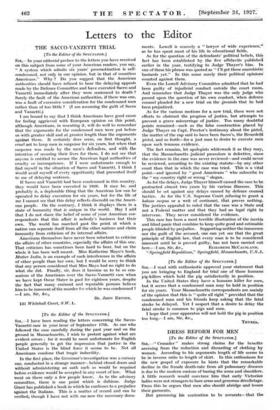[To the Editor of the SPECTATOR.] SIR,—I have been reading
the letters concerning the Sacco- Vanzetti case in your issue of September 17th. As one who followed the case carefully during the past year and on the ground in Massachusetts, I wish to protest against what are evident errors ; for it would be most unfortunate for English people generally to get the impression that justice in the United States is the blind force it seems to be. Not all Americans condone that tragic imbecility.
In the first place, the Governor's investigation was a cursory one, conducted in a strange manner—behind closed doors and without "administering an oath such as would be required before evidence would be accepted in any court of law. What went on there only a few people' know. As to the advisory committee, there is one point which is dubious. Judge Grant has published a book in which he confesses to a prejudice against the Italians. This is a matter of record and can be verified, though I have not with me now the necessary docu-
ments. Lowell is scarcely a " lawyer of wide experience," as he has spent most of his life in educational fields.
As for the question of the defendants' political beliefs, this fact has been established by the five affidavits published
earlier in the year, testifying to Judge Thayer's bias. In one of these his phrase was quoted as " I'll get those anarchistic bastards yet." In this sense surely their political opinioni counted against them.
Even the Lowell Advisory Committee admitted that he had been guilty of injudicial conduct outside the court room. And remember that Judge Thayer was the only judge who passed upon the question of his own conduct, when defence counsel pleaded for a new trial on the grounds that he had been prejudiced.
As for the various motions for a new trial, these were not efforts to obstruct the progress of justice, but attempts to prevent a grave miscarriage of justice. Too many doubtful points remained—such as the false construction placed by Judge Thayer on Capt. Proctor's testimony about the ,pistol, the matter of the cap said to have been. Sacco's, the Berardelli pistol, and so forth—for a just man to desire to execute men
upon such tenuous evidence. .
The fact remains, let apologists whitewash it as they may, that the Massachusetts judicial procedure is defective, since the evidence in the case was never reviewed—and could never be reviewed, according to the existing statute—by any other court than that in which the case was tried. This is a vital point—and ignored by " good Americans " who subscribe to the " my country right or wrong " slogan, As for the delays, Judge Thayer himself caused the case to be protracted almost two years by his various. illnesses. This should be set against any delays caused by defence counsel tactics. As for the U.S. Supreme Court ,refusing to grant a habeas corpus or a writ of certiorari,, that proves nothing. The justices appealed to ruled that the case was .a State and not a Federal matter and that they had no legal right to intervene. They never considered the evidence. , This case has been a most terrible illustration of the inertia and blind panic that combine to keep quite good and estimable people blinded by prejudice. Supporting neither the innocence nor the guilt of the accused, one can yet see that the great principle of English law, that every man is to be considered innocent until he is proved guilty, has not been carried out here.—I am, Sir, &c., ELIZABETH MCCAUSLAND, "Springfield Republican," Springfield, Massachusetts,










































 Previous page
Previous page